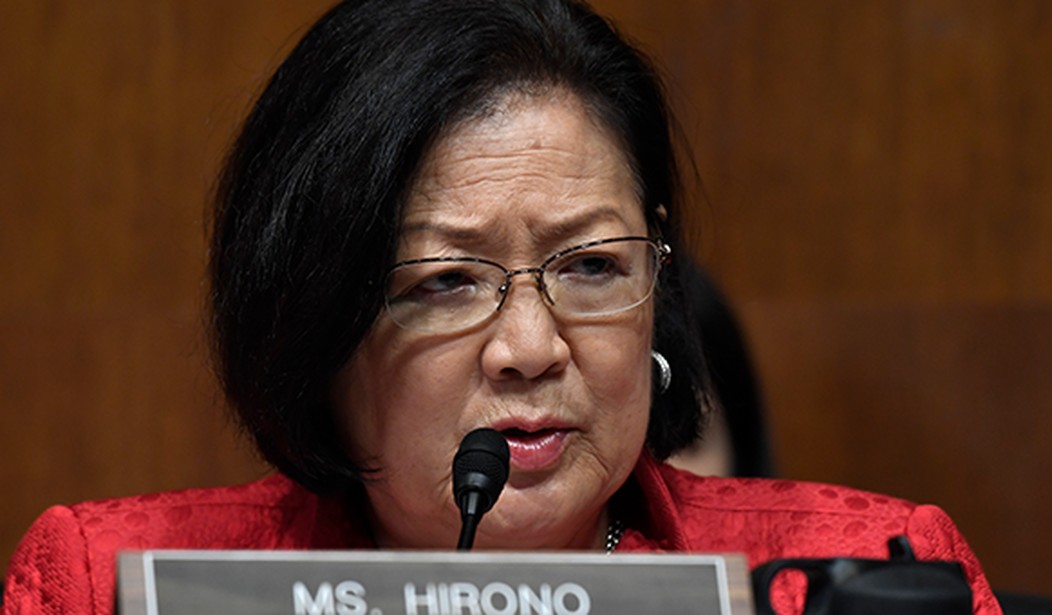From what I gather, Sen. Mazie Hirono (D-HI) is a nice person. Politically, she's trash. I've been hard on the liberal senator from Hawaii, but that's not my fault. Sorry, when you don't know basic stuff, like what constitutes illegal immigration, I'm going to hurl a tomahawk your way. She doesn't understand unlawful immigration. She had a facepalm-worthy self-own during the Ketanji Brown Supreme Court hearings. Mazie Hirono's job centers on spewing Democratic Party talking points, so let's make peace with that aspect. Her latest lecture was about originalism at today's Judicial Committee hearing on abortion, and it sure was a doozy.
Senator Mazie Hirono on originalism:
— Townhall.com (@townhallcom) July 12, 2022
"Justices who take that approach...pretend that they know what our founding fathers meant when they drafted the Constitution...who the heck would know...? Is there any reference to AR-15 rifles in our Constitution? No!" pic.twitter.com/04tZz9qPva
"Justices who take that approach...pretend that they know what our founding fathers meant when they drafted the Constitution...who the heck would know...? Is there any reference to AR-15 rifles in our Constitution? No!"
Yeah, and there is nothing about abortion, senator. You can track the boomerang before it makes contact with the Left's face. There was never a constitutional right to obtain an abortion. Even liberal legal analysts knew that Roe v. Wade was beyond shoddy in its reasoning. They were worried; even Ruth Bader Ginsburg felt Roe was flawed. The liberal wing of the Supreme Court was never going to last forever. There was always a possibility that the GOP would get some judges appointed that could overturn the ruling, which happened under Trump. It returns to the legislative process, which, as we've discussed—frightens the Left to death. They must go out there and sell their abortion extremism to the public. It won't play well with voters.
Yet, back to moron Mazie here. There are these things called primary documents that tell us what the Founders meant. That's basic history. Of course, originalists look at the current phenomena and track them through history. The late Justice Antonin Scalia, one of originalism's greatest advocates, also delivered a master lecture on how one holding this constitutional view would form an opinion on a case.
Recommended
In an interview on University of California Television years ago, Scalia noted one case, Saia v. New York, which was a legal challenge to the city's ordinance on sound trucks. Saia was a Jehovah's Witness minister and gave various sermons using this device. He was fined for it and sued under First Amendment grounds. Well, sound trucks, as Scalia noted, were not around at the time of the Constitution's ratification, so you have to track the trajectory of the First Amendment. No sound trucks but there were public nuisance laws.
And there is no uniformity with originalism. Clarence Thomas is the other originalist on the Court. He and Scalia disagreed on McIntyre v. Ohio Elections Commission in 1995. Margaret McIntyre was distributing pamphlets opposing a local school tax. There was no 'paid for' text at the bottom. She was doing it anonymously, which was barred nationwide. You needed to disclose who was funding your campaign speech at the time. Scalia admitted that this one stumped him. Everyone knew who voted for whom at the time of our founding. We adopted the Australian ballot over a century ago. These laws were in place for over a century. He couldn't figure out what the Framers would have thought, so by default Scalia thought the law constitutional and dissented. It was a 7-2 decision striking down the law forbidding anonymous campaigning as unconstitutional.
The late justice added that Clarence Thomas joined the majority opinion citing The Federalist Papers, which Alexander Hamilton, John Jay, and James Madison authored but were initially published under the name "Publius."
Scalia also said that it's unfair to demand perfection from originalism, but they have answers to many issues, especially the most controversial ones. Concerning the right to abortion, death penalty, and suicide—Scalia adds that none of the Founders felt that's what the Equal Protection Clause meant regarding these issues, and neither did the Eighth Amendment.
"Easy, easy answers, I don't even need to read the briefs for Pete's sake," he said, prompting the audience chuckles.
Originalism seeks to maintain our founding document as one that prohibits the government from overreaching. That's what's are the core of the Bill of Rights. That's why the Constitution is loaded with mechanisms to slow down the government's pace. The word that guided our Founders about our then-fledgling republic is safety. It wasn't efficient.
Liberals hate originalism because it's the obstacle to their true aim, which is to shred our Constitution. It's a must-do on the list. The lion's share of the progressive agenda reeks of overreach. This document gets in the way of that—though on abortion if the legislature deems it fit to pass a law permitting abortion in all cases, that can happen. A law banning abortion would be allowed as well. There is nothing in the Constitution about abortion, so both sides can have at it and pass a law that reflects the current society. Scalia was adamant that's how you keep society up to date. It's not by weaponizing the judiciary to accomplish those aims.

























Join the conversation as a VIP Member